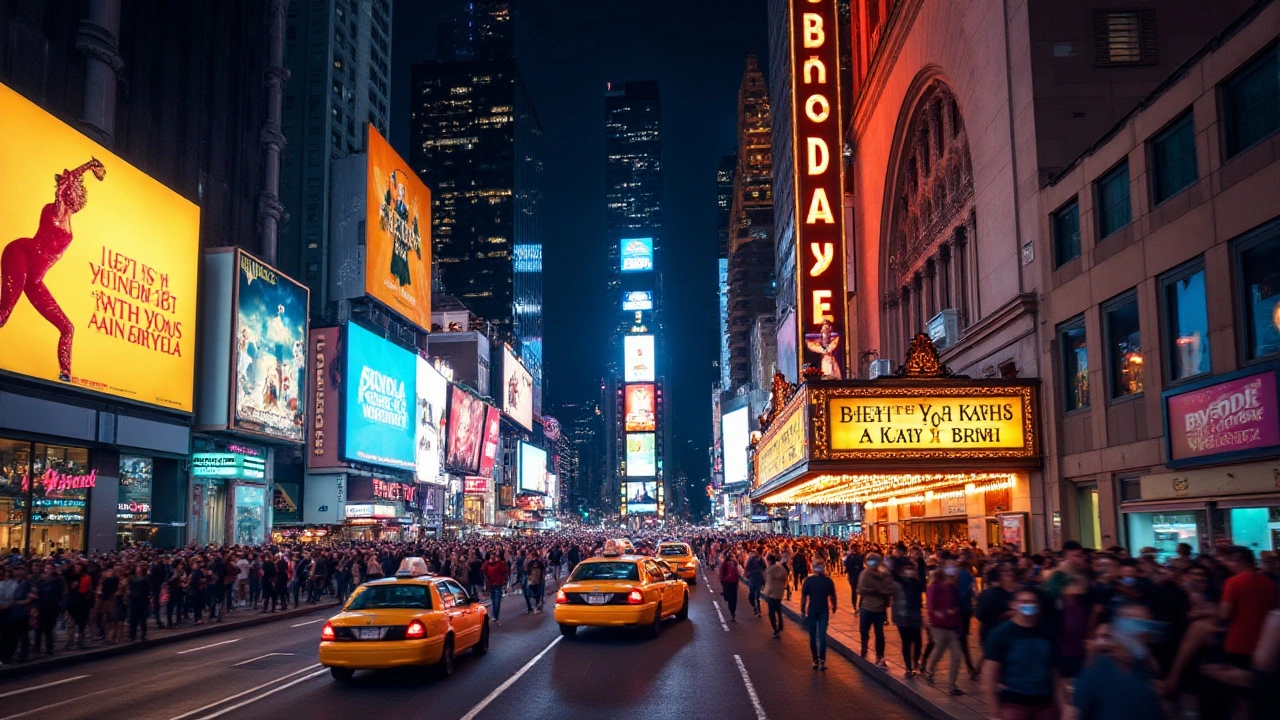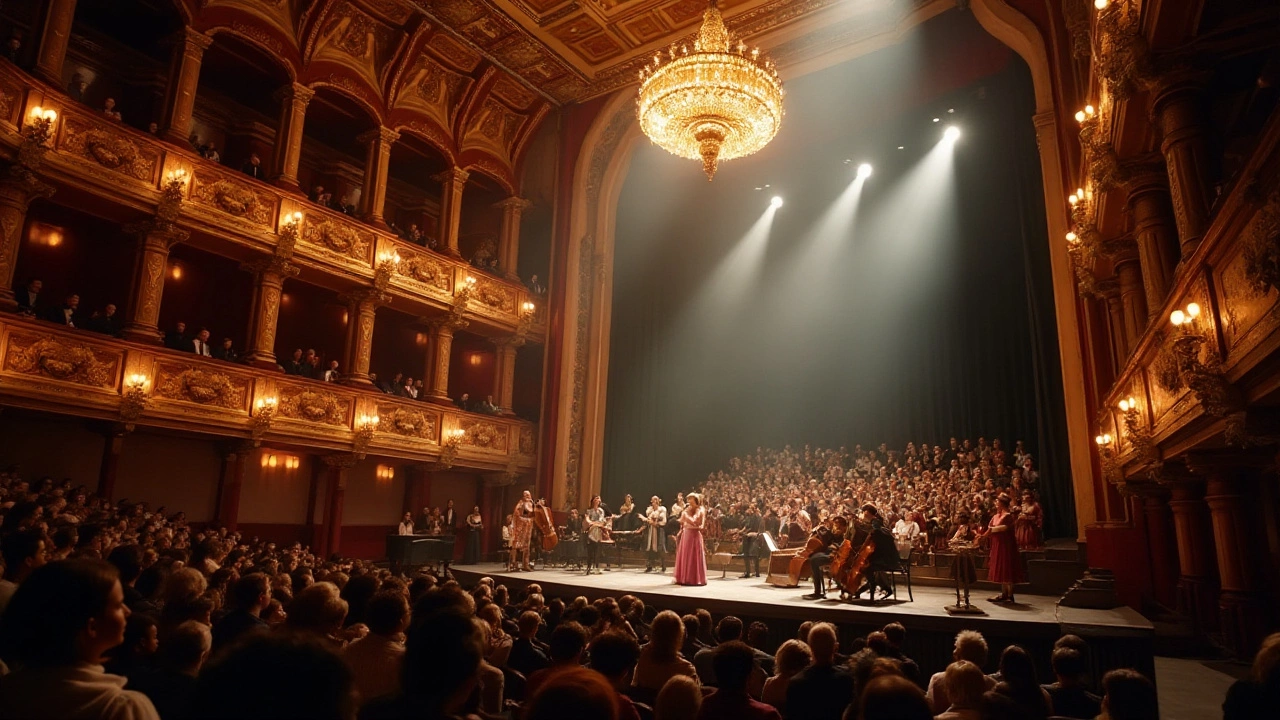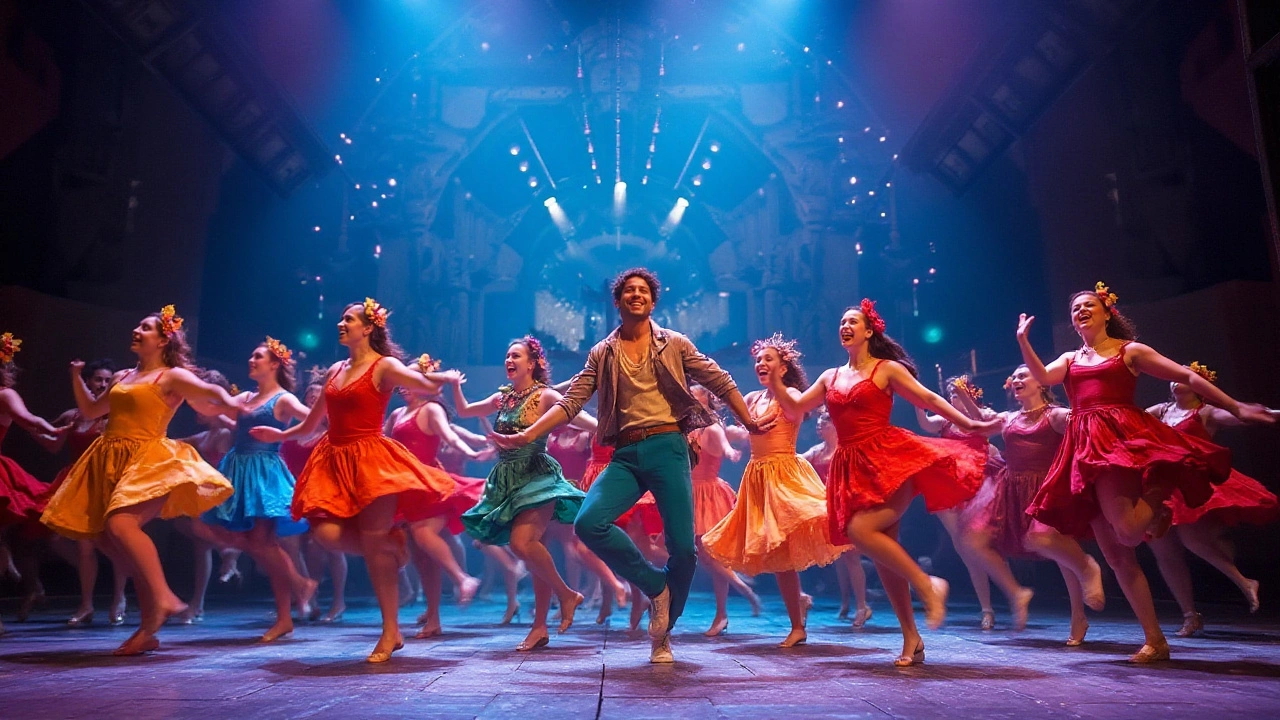Discover the Best Broadway Shows of 2024: A Theatrical Delight
 Dec, 16 2024
Dec, 16 2024
When it comes to live performances, nothing quite captures the imagination like a Broadway show. These productions combine world-class talent, stunning visual effects, and heart-stirring music. If you're lucky enough to visit New York City, there's no shortage of incredible theatre experiences waiting for you.
This year, three shows have captured the spotlight like no others: "Hamilton," "Wicked," and "The Lion King." Each offers something unique, whether it's a fresh take on history, a reimagined fantasy tale, or a beloved classic brought to life in spectacular fashion. Let's explore what makes these shows the remarkable experiences they are, and how you can make the most of your Broadway adventure.
- The Charm of Hamilton: History in Harmony
- Wicked: The Untold Stories of the Witches of Oz
- The Magic of The Lion King: A Visual Spectacle
- Tickets and Tips: How to Catch These Shows
- Broadway's Everlasting Impact on Culture
The Charm of Hamilton: History in Harmony
"Hamilton" isn't just a musical; it's a cultural phenomenon that has redefined Broadway and shifted the paradigms of musical storytelling. This masterpiece, created by Lin-Manuel Miranda, artfully blends hip-hop, jazz, R&B, and traditional show tunes to tell the story of American founding father Alexander Hamilton. Through its innovative use of music and diverse cast, "Hamilton" offers a refreshing take on history, making the tale of America’s past relevant and accessible to audiences today. The show's groundbreaking approach to storytelling has earned it numerous accolades, including a Grammy, a Pulitzer Prize for Drama, and eleven Tony Awards.
One of the unique aspects of "Hamilton" is its casting. The show features actors of color as the Founding Fathers and other historical figures, a decision that adds depth and modern relevance to the narrative. This deliberate diversity in casting provides a new perspective on America’s origin, reflecting a more inclusive view of history and society. The character of Alexander Hamilton, portrayed initially by Lin-Manuel Miranda himself, showcases a blend of ambition, intelligence, and vulnerability, making the character both relatable and inspiring.
"HAMILTON makes us feel the unstoppable, urgent rhythms of a nation being born, and helps us perceive that nation’s character, including its warpings and contradictions, vertically." — Ben Brantley, The New York Times
The music of "Hamilton" is perhaps its most compelling aspect. Miranda's lyrics are dense with historical and cultural references, combining the styles of hip-hop and traditional musical form. Songs like "My Shot" and "The Room Where It Happens" have become cultural touchstones, echoing the struggles and aspirations that define the American spirit. This blend of musical genres not only entertains but also educates the audience, creating a unique blend of entertainment and history lesson.
The performance style is equally dynamic, with physically demanding choreography that complements the rapid pace and rhythm of the music. The production’s use of a revolving stage, seamlessly shifting through scenes, adds to the fluidity of the storytelling, making transitions feel natural and engaging. This continuous motion mirrors the swift pace of Hamilton’s own life and the tumultuous times he lived in.
Since its debut in 2015, "Hamilton" has maintained its status as a must-see show on Broadway. Tickets are in high demand, often selling out months in advance. For those planning to see it, securing tickets requires some strategy and flexibility. While options like lotteries and last-minute releases are available, pre-planning and exploring various ticket platforms can enhance your chances of witnessing this remarkable performance. "Hamilton"'s impact on Broadway is undeniable, influencing an array of productions to follow in its footsteps by incorporating similar themes and modern interpretations.
The legacy of "Hamilton" continues to grow, inspiring educators and curricula around the world to incorporate its themes and music in discussions about history and identity. With each performance, "Hamilton" doesn’t just retell stories from the past; it provokes thought about today’s world, its challenges, and its potential.
Wicked: The Untold Stories of the Witches of Oz
Long before Dorothy dropped in, two other girls met in the land of Oz. One of them, with emerald-green skin, is intelligent, fiery, and misunderstood. The other is beautiful, ambitious, and enormously popular. These two unlikely friends grow up to become the Wicked Witch of the West and Glinda the Good Witch—well before Dorothy's famed yellow-brick journey begins. Ever since its debut on Broadway in 2003, Wicked has enchanted audiences with its tale of friendship, love, and the pull between good and evil. It's a story that flips the script on what we thought we knew about the world of Oz, challenging perceptions and exploring the complex influences of our beliefs.
Adapted from Gregory Maguire's 1995 novel "Wicked: The Life and Times of the Wicked Witch of the West," the musical delves deep into the backstory of Elphaba and Glinda, breathing new life into these characters. The legendary Stephen Schwartz, who composed the unforgettable score, filled the stage with such captivating songs as "Defying Gravity" and "Popular," which have become iconic touches of Broadway magic. Indeed, one of the reasons Wicked has remained such a stalwart within the Broadway community is due to its mix of profound narrative depth and lyrical brilliance. Its universal themes of identity, love, and power resonate across generations, breaking records and hearts along its journey.
"Wicked works because it makes sure its themes are never overshadowed by its spectacle," writes The New York Times, "and in every soaring note, it's as much about who we are as where we come from."The production's stunning visual and auditory experience boasts award-winning costumes designed by Susan Hilferty, set pieces that transport audiences to fantastical realms, and lighting that captures the magic and occasional darkness of Oz. All these elements come together seamlessly, transforming the stage into a vibrant, swirling pot of creativity and narrative prowess.
Legendary performances by the original cast, including Idina Menzel as Elphaba and Kristin Chenoweth as Glinda, set high benchmarks for all subsequent actors who have slipped into these beloved roles. Fans often delight in comparing different portrayals, finding nuances and flavors that bring fresh perspectives to the characters' arcs. With each performance, the actors breathe new life into the story, maintaining a sense of continuity while allowing for unique interpretations.
For those wishing to witness Wicked in all its glory, it is wise to secure tickets well in advance. This is particularly true since certain dates sell out quickly, and prime seats are often gone days after release. Here are some tips on enhancing your theater experience: if you're looking for the quintessential view, aim for the center mezzanine; this perspective provides a sweeping view of the stage's grand set pieces. Additionally, don't forget to rent or purchase a binocular for intricate costume design details from your seat—trust us, they're not to be missed!
Ultimately, Wicked continues to reinvent the Oz mythos, weaving together strands of humor, heartache, and righteous rebellion into a mesmerizing tapestry that speaks to the timeless struggle to belong and make a difference. Whether you're a repeat visitor or a first-timer, this Broadway classic offers a potent reminder of the magic and power of theatre, bringing audiences into a world where courage and friendship change everything. So why wait? Let Wicked sweep you off to a place where new friendships begin, and destinies are reimagined.

The Magic of The Lion King: A Visual Spectacle
The roar of the African savanna comes to vibrant life in Disney's "The Lion King,” a theatrical triumph that has enchanted audiences since its Broadway debut in 1997. This production stands as a visual spectacle not just because of its captivating story, but due to the ingenious creativity that transforms the stage into a living, breathing landscape. At the heart of this enchantment is director Julie Taymor's innovative use of puppetry and masks, a nod to ancient storytelling traditions that brings an immersive and artistic dimension to the performance. Audiences are greeted by a mesmerizing sunrise cascading over the stage, where animals parade in a grandiose spectacle during the 'Circle of Life,' capturing imaginations from the very first note.
The impact of Taymor's direction and design is extraordinary. Her approach to costume design, which seamlessly integrates the actor and the animal, provides an unparalleled theatrical experience. Each actor not only portrays an animal but becomes one, thanks to meticulously crafted costumes that use shadow, texture, and movement to stunning effect. This blend of art and performance creates moments of pure magic, as the lines between reality and imagination blur. The intricate giraffes, created using stilts and long neck motifs, and the majestic elephant, operated by multiple performers, are just some of the elements that solidify "The Lion King" as a historically significant production. The musical's powerful visual tableau is further enhanced by Garth Fagan's choreography which translates animal behaviors into invigorating dance moves, propelling the storytelling in dynamic ways.
One could argue that the music of "The Lion King" serves as its soul. Composed by Elton John with lyrics by Tim Rice, the score is both epic and intimate, singing its way into the hearts of audiences worldwide. Songs like "Hakuna Matata" and "Can You Feel the Love Tonight" are instantly recognizable, weaving nostalgia with new interpretation. A striking element is the incorporation of African rhythms, adding richness and depth to the musical journey.
"Taymor uses all the elements of theater art to tell her story, not just dialogue and music, but movement, puppetry, masks – creating a sensory experience," noted theater critic Ben Brantley.It's this melding of cultural influences that elevates the show’s music, transporting audiences not just with sound, but with emotion and resonance. Few productions achieve the kind of musical transcendence seen here.
For those planning to visit Broadway, catching "The Lion King" is a worthy endeavor. Tickets can be in high demand, so it's wise to book in advance. Prices will vary based on seating and availability, with premium seats offering the most immersive experience. To enhance your visit, take the time to learn about the behind-the-scenes magic, perhaps through a digital exploration offered by Broadway's official site, which provides insights into how the elaborate illusions are achieved. This prior knowledge can deepen appreciation for the artistry involved. Undoubtedly, "The Lion King" is more than just a show; it's an enduring reminder of how theater can transform and inspire, promising an adventure where the wild heart of Africa beats in every note and movement on stage.
Tickets and Tips: How to Catch These Shows
Seeing a Broadway show is a dream for many, but securing tickets to these top productions, especially Hamilton, Wicked, and The Lion King, can be quite an adventure in itself. One of the first steps to make this happen is to be aware of when and where tickets are available. Websites such as Ticketmaster, BroadwayDirect, and the official Broadway League website provide reliable information about show timings, ticket releases, and potential discounts. It's important to keep an eye on these platforms, as tickets often sell out quickly due to the high demand associated with popular shows.
Another excellent approach is to explore options like the Broadway Lottery and Rush Tickets. These offerings can be found for multiple shows, allowing theatergoers a chance to nab tickets at significantly reduced rates. This can be a wonderful opportunity for those looking to experience the magic of Broadway without breaking the bank. However, it’s important to note that these tickets are usually available only on the day of the performance. Thus, planning flexibility and a bit of luck are key components to success here. According to the Broadway League's reports, about 20% of theatergoers utilize these methods to gain access to their favorite shows, reflecting their growing popularity.
Maximizing your Broadway experience also means considering the seat selection. While it’s common to assume that front-row seats offer the best view, sometimes these can be too close to enjoy the scale of the most visually stunning productions like The Lion King. Mid-range seats often provide a better perspective for taking in magnificent sets and dazzling choreography. The theater layouts in NYC are sophisticated, and being mindful of where you sit can significantly impact how you perceive the show. Opting for views that balance proximity and breadth will offer you a fulfilling theatrical experience.
It’s also interesting to note that many theaters offer standing-room tickets at a fraction of the cost for a full seat. These are great for spontaneous visitors or those who want to take in a show without previous planning. Many Broadway enthusiasts claim the energy and atmosphere experienced from these sections can be wonderfully engaging. Another useful tip is to sign up for newsletters and alerts from major theaters and ticket vendors. This way, you'll stay informed about any deals, special performances, or last-minute ticket releases.
Lastly, don’t underestimate the power of networking with other theatergoers. Fans of Broadway are known for their passionate communities and are often willing to share tips and trade tickets. Joining online forums and social media groups dedicated to Broadway enthusiasts can provide not just helpful advice, but also options for accessing tickets in unusual ways. Remember, planning early, keeping an eye on multiple ticket avenues, and joining a vibrant community are all part of ensuring you get to witness the year's best Broadway magic firsthand.

Broadway's Everlasting Impact on Culture
Broadway is much more than just a series of performances—it’s a cultural phenomenon that has shaped and continues to influence a wide swath of art and society. From the bright lights of Times Square to theatres across the world, Broadway productions echo cultural sentiments and often serve as catalysts for societal change. These shows share stories that spark dialogue, confront societal norms, and often challenge the audience's perspectives. The power of Broadway comes from its ability to mirror reality while providing hope and inspiration, frequently paving the way for new approaches in storytelling and performance art.
One pivotal example of Broadway's cultural impact is the game-changing success of the musical "Hamilton." By infusing the story of American founding father Alexander Hamilton with contemporary hip-hop and diverse casting, the show not only revolutionized how historical narratives can be presented but also brought discussions of race and representation to the forefront. Notably, Lin-Manuel Miranda, the creator of "Hamilton," reflected on its influence by stating,
"What 'Hamilton' does is take the story of a man who embodies the promise of America and depicts him as having the same flaws as the country itself."This fresh approach demonstrated that Broadway can simultaneously be a reflection and a visionary of culture.
Similarly, the long-running show "Wicked" takes another form of timeless storytelling by revisioning the classic "Wizard of Oz" from a new perspective. By exploring the backstories of the Wicked Witch of the West and Glinda the Good Witch, the musical challenges preconceived notions and fosters empathy. Its adaptation encourages audiences to reconsider issues like morality, friendship, and societal judgment. This narrative flexibility that Broadway allows often escalates into societal introspection, offering not only entertainment but deep personal reflection.
Beyond the stories they tell, Broadway productions have a palpable impact on the arts economy and tourism. Each year, millions flock to New York City not just to witness the grandeur of Broadway, but to experience the magic that transcends language and culture barriers. According to the Broadway League, over 14 million attended a Broadway show, resulting in substantial economic contributions exceeding billions in revenue—this testament to Broadway’s pulling power and its role as a cultural ambassador.
The influence of Broadway extends beyond the stage and into films, television, and literature, often dictating or reflecting broader pop-cultural trends. Adaptations of musicals to movies and TV series have seen an upsurge in recent years, earning new fans globally and increasing accessibility from the stages in New York to living rooms worldwide. Whether through cast recording soundtracks that soar to the top of music charts or inspired adaptations, Broadway continues to enrich American and global culture significantly.
From the past century into the astonishing ongoing productions of today, Broadway remains a cherished and influential institution. Its contemporary impact and the timelessness of its stories ensure that Broadway's cultural shadow continues to be long and significant. As creators and audiences alike push the boundaries of theatrical storytelling, Broadway will surely continue to mold the cultural fabric of tomorrow just as it has done since the early 20th century.